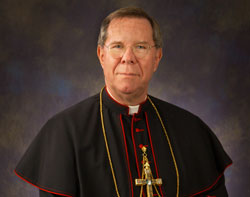A Christmas greeting from Archbishop Daniel M. Buechlein, O.S.B.
 Dear Sisters and Brothers in Christ:
Dear Sisters and Brothers in Christ:
The Christmas crib scenario captures our fancy. Do you ever wonder why we romanticize a barnyard scene which surely was not an ideal place for a child to be born? I think I know why. All we need to do is look at a Christmas crib scene for a little while in order to realize that Christmas belongs to everybody. We like that. For one brief moment, Christmas brings everybody together.
Look who’s there! Working shepherds represent the poor of the world. That already captures all of us because in one way or another we are all poor—whether spiritually, physically, morally, emotionally or financially. The three Wise Men from the Orient represent the curious, the learned, the rich and the worldly powerful. That could be all of us, too, because we are all blessed with unique personal gifts.
Singing angels from God signal that this stable gathering is no ordinary scene. Yet it is a family scene; new parents are there and a new little baby is at the center of it all. We are all there somehow. And let’s not forget the animals. After all, the setting is a barnyard stable, a cave near Bethlehem.
Dumb animals, beasts that carry people’s burdens, witness to a scene that was surely both common and uncommon to them as well. Even in those days, not many children were born in a stable. Was this birth in an animal shelter simply an accident because Joseph might have forgotten to make reservations at an inn in Bethlehem? Did this happen because of poor planning? If so, isn’t it like so many chance happenings in our own lives—God’s mysterious workings often seem to happen “by accident”?
The Christmas crib scene lets most of our world stop for a brief moment and brings many of us together, but it does so much more. The simplicity of the animal stable masks a rich teaching, which should be no surprise. After all, the new baby at the center of it all is the Divine Word made flesh. Jesus is God’s revelation of himself to us. The crib scene is a teaching scene, a classroom; it is a revelation. Somebody once called that stable Christ’s cathedral; the manger was his first cathedra, his first teaching chair. No detail of that Nativity scene is an accident.
What does the birth of the Word Incarnate tell us about God? God loves the poor. God loves the curious. God loves the gifted. God loves simplicity. God loves the animals, and God understands the burdens we carry, sometimes like beasts of burden. God can and does work through the reversals, the accidents of life, like forgetting to make reservations at the inn. God understands the suffering in our lives. Like us, God’s Son was born into the unfairness of life’s suffering. God meets us in suffering in a special way and in any circumstance, like in an animal shelter on a cold winter night.
Maybe we romanticize the crib scene because it is too much to grasp that God could be so loving in such awkward surroundings. Don’t you think God gives us the poetic flourish of singing angels on that cold winter night so that we can believe his grand drama of barnyard simplicity?
God came to Earth to tell us that he is always with all of us. We are all there in that barnyard stable. God came into our world for everybody, and the greatest message of all is that we are all equal as we kneel before the manger of Christ’s first teaching chair. Indeed, let’s kneel before the manger of Jesus with hearts full of grateful love.
As I kneel before the crib, I pray that you may find peace of mind and heart and soul before Christ’s first teaching chair—at Christmas and for the New Year!
Sincerely yours in Christ,
Most Rev. Daniel M. Buechlein, O.S.B.
Archbishop of Indianapolis
 Dear Sisters and Brothers in Christ:
Dear Sisters and Brothers in Christ: